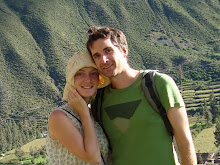We were going to spend a week in Machala, the 'banana capital of the world' visiting banana producers and local projects funded by fair trade premium money. However, after four days of visits we departed for Northern Peru to write up the information because Southern Ecuador is a not only hot and dusty with nothing much to see but miles of bananas but it also has overpriced hotels, more mosquitoes and less friendly locals.
 Banana plantations as far as the eye can see.
Banana plantations as far as the eye can see.2okg of bananas on that there 'racima'. Not too bad to lift but before the workers had rails to hang them on and transport them it could have meant walking back and forth for a few hundred meters all day long. They would feel very heavy then I think.

Mmm, lovely banana. If only everyone we tried to take pictures of would smile this nicely.

All aboard the banana bus. This minibus pictured below takes children from the countryside to schools. We had a fun hour in a car in the rain with our sometimes helpful guide/driver/cooperative worker trying to track the bus down. Things often conspire to cause difficulties on these visits and it so happens that Ecuador is in the middle of long school holidays. So when we eventually found the bus we then, quite ridiculously, had to round up some confused local children, who happened to be where the bus pulled over, to pose for us with local bananas that we put fair trade stickers on. It is a big cooperative we visited, very used to showing people around, so you might think they would organise things to run smoothly for us but that is seldom the case.

A highlight was one of the organic farms we visited. Large, conventional plantations are depressing places where nothing lives but banana plants, mosquitoes and the occasional spider. The chemicals (overhead sprayed) and fertilizers necessary to maintain production see off anything else on the farm as well as the area around and in the local water courses. Workers get poorly, the land is ruined but we get cheap bananas.
Fair trade certification puts limitations on chemicals and, when it works well (it often does), has a big impact on farmers, workers and the community with health and education projects.
Visiting a good organic farm is when you notice a massive difference. Flowers grow beneath the plants and parrots nest in the trees; birds and brightly coloured lizards feed on ants, worms and bugs in the earth. There are various types of fruit trees growing around the bananas providing food for the family and workers. And on this one farm we found a wonderful first- an uncontaminated fresh water source not only feeding the farm but teeming with little fish and this fresh water shrimp.

Having visited banana farms I can say that buying fair trade when possible is a great thing to do but if you care about the earth and the health and future of the people who grow the fruit, then, certainly for bananas, organic is the most important certification of all.
From now on we will always aim to buy organic bananas and if we can find fair trade + organic bananas then all the better.

No comments:
Post a Comment